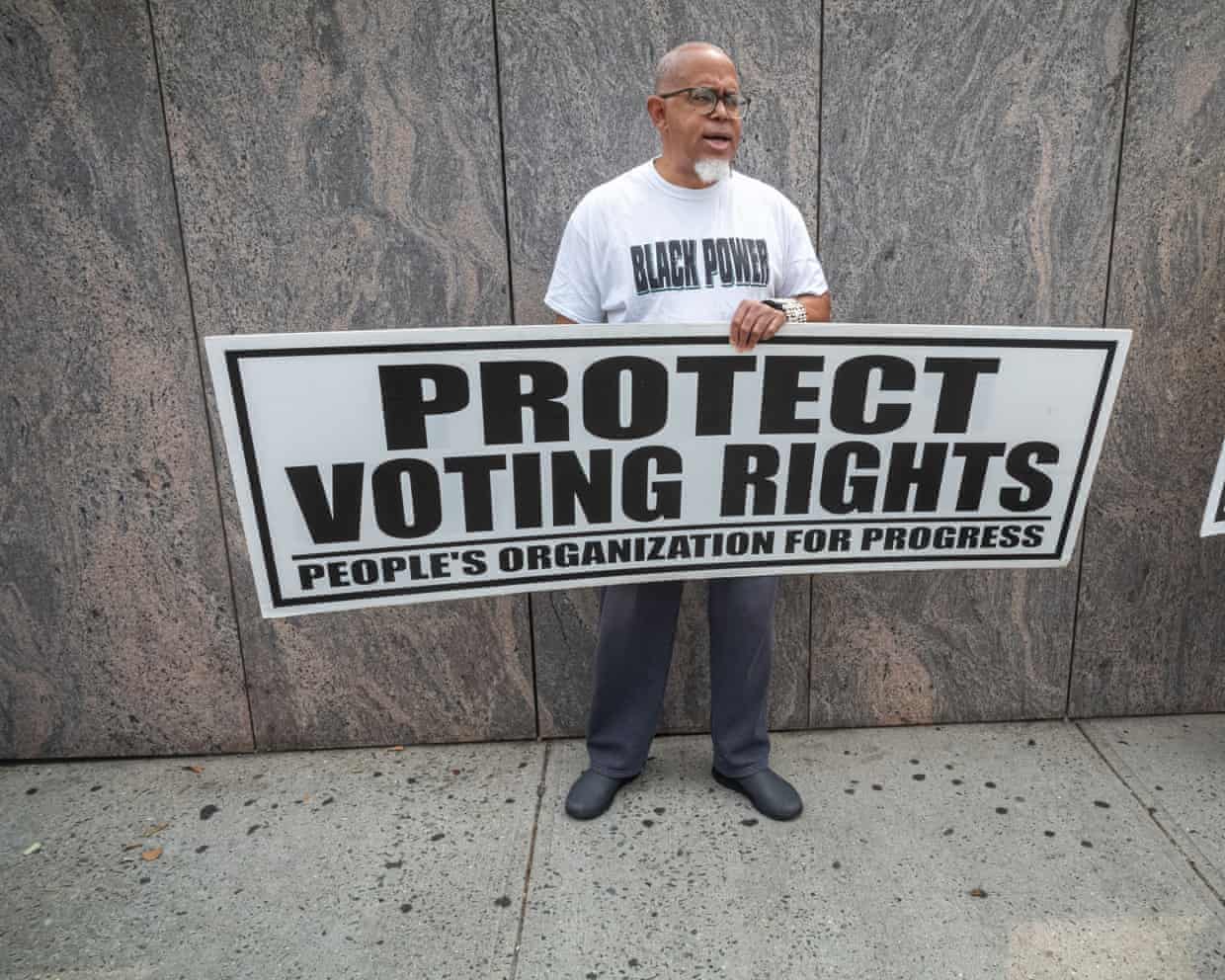
Trump DOJ to begin handing over Epstein files to House Oversight investigators
Entities mentioned:
- Department of Justice: Duty, Transparency, Control
- James Comer: Determination, Transparency, Duty
- House Oversight Committee: Duty, Justice, Transparency
- Trump administration: Transparency, Self-preservation, Control
- Jeffrey Epstein: Power, Greed, Control
- Ghislaine Maxwell: Power, Loyalty, Self-preservation
- Democrats: Competitive spirit, Self-preservation, Influence
- Republicans: Justice, Competitive spirit, Influence
- Jasmine Crockett: Duty, Self-preservation, Professional pride
Article Assessment:
Credibility Score: 75/100
Bias Rating: 55/100 (Center)
Sentiment Score: 45/100
Authoritarianism Risk: 25/100 (Generally Democratic)
Bias Analysis:
The article presents multiple perspectives, including both Republican and Democratic viewpoints, suggesting an attempt at balance. However, there is slightly more focus on Republican actions and statements, which nudges it just right of center.
Key metric: Government Transparency and Accountability
As a social scientist, I analyze that this article highlights a significant development in government transparency and accountability. The DOJ's willingness to release documents related to the Epstein case to the House Oversight Committee represents a step towards increased scrutiny of high-profile cases. This action may impact public trust in government institutions and the justice system. The bipartisan nature of the request suggests a unified interest in uncovering the truth, which could potentially strengthen democratic processes. However, the political undertones and varying priorities between parties indicate that the motivations behind this investigation are complex and multifaceted. The emphasis on protecting victims and handling sensitive information responsibly demonstrates a balance between transparency and ethical considerations. This case may set a precedent for how similar high-profile investigations are handled in the future, potentially influencing public expectations for government accountability.

Republicans sue to block Newsom’s fast-track California redistricting plan
Entities mentioned:
- Republicans: Power, Control, Competitive spirit
- Gavin Newsom: Ambition, Influence, Control
- California: Unity, Justice, Self-preservation
Article Assessment:
Credibility Score: 70/100
Bias Rating: 55/100 (Center)
Sentiment Score: 40/100
Authoritarianism Risk: 35/100 (Generally Democratic)
Bias Analysis:
The article presents a relatively balanced view of the conflict, mentioning both Republican actions and Newsom's plan. However, the framing slightly emphasizes the Republican challenge, potentially suggesting a slight center-right lean in presentation.
Key metric: Electoral Representation
As a social scientist, I analyze that this lawsuit by Republicans against Governor Newsom's redistricting plan reflects ongoing partisan tensions over electoral map-drawing processes. The fast-track approach suggests an attempt to expedite changes, potentially altering the balance of power in California's congressional representation. This legal challenge highlights the high stakes involved in redistricting, as it directly impacts political representation and voting power. The conflict underscores the complex interplay between state executive actions and legislative processes in shaping electoral landscapes, with potential long-term consequences for both parties' political influence in the state.

House Oversight Chair says Justice Department to start providing Epstein-related records on Friday
Entities mentioned:
- James Comer: Ambition, Justice, Influence
- Department of Justice: Duty, Control, Professional pride
- Bill Barr: Loyalty, Self-preservation, Duty
- Jeffrey Epstein: Power, Greed, Self-preservation
- Donald Trump: Power, Self-preservation, Legacy
- Democrats: Competitive spirit, Justice, Influence
- Republicans: Competitive spirit, Justice, Influence
- Mike Johnson: Control, Influence, Wariness
Article Assessment:
Credibility Score: 75/100
Bias Rating: 55/100 (Center)
Sentiment Score: 40/100
Authoritarianism Risk: 30/100 (Generally Democratic)
Bias Analysis:
The article presents multiple viewpoints, including both Republican and Democratic perspectives. While it gives slightly more space to Republican statements, it balances this with critical Democratic responses, maintaining a relatively centrist approach.
Key metric: Government Transparency and Accountability
As a social scientist, I analyze that this article highlights ongoing tensions between political parties and government institutions regarding the handling of sensitive information. The pursuit of Epstein-related records by the House Oversight Committee underscores a broader struggle for transparency and accountability in high-profile cases. The involvement of former high-ranking officials, including ex-Attorney General Bill Barr, suggests a complex interplay of political motivations, institutional responsibilities, and public interest. The differing perspectives between Republicans and Democrats on the investigation's authenticity and thoroughness reflect deeper partisan divides in addressing controversial issues. This situation may impact public trust in government institutions and the justice system, potentially influencing future policy-making and oversight processes.

Bill Barr testifies he didn't see info that would 'implicate' Trump in Epstein case, Comer says
Entities mentioned:
- Bill Barr: Duty, Professional pride, Loyalty
- Donald Trump: Self-preservation, Power, Influence
- James Comer: Ambition, Justice, Control
- Jeffrey Epstein: Power, Greed, Self-preservation
- Biden administration: Power, Control, Influence
- House Oversight Committee: Justice, Control, Duty
- Democrats: Competitive spirit, Justice, Control
- Republicans: Loyalty, Power, Control
- Suhas Subramanyam: Justice, Ambition, Duty
Article Assessment:
Credibility Score: 65/100
Bias Rating: 55/100 (Center)
Sentiment Score: 45/100
Authoritarianism Risk: 35/100 (Generally Democratic)
Bias Analysis:
The article presents multiple perspectives, including both Republican and Democratic viewpoints. However, it gives more detailed coverage to Republican statements, particularly from Chairman Comer, which slightly tilts the balance.
Key metric: Government Accountability and Transparency
As a social scientist, I analyze that this article highlights the ongoing investigation into the handling of Jeffrey Epstein's case, focusing on former Attorney General Bill Barr's testimony. The investigation appears to be part of a broader effort to assess government accountability in high-profile cases. Barr's testimony, suggesting no implication of former President Trump in the Epstein case, raises questions about the thoroughness of the investigation and potential political motivations. The partisan divide in the committee's approach to questioning Barr indicates a politicization of the process, which may impact public trust in government institutions and their ability to handle sensitive cases impartially. This investigation could influence public perception of government transparency and the justice system's effectiveness in dealing with powerful individuals.

California Democrats unveil redistricting map to wipe out 5 GOP seats, counter Texas plan
Entities mentioned:
- Democratic Congressional Campaign Commission (DCCC): Power, Control, Justice
- Gov. Gavin Newsom: Ambition, Power, Revenge
- California Democrats: Power, Control, Competitive spirit
- President Donald Trump: Power, Control, Self-preservation
- Republicans: Power, Control, Self-preservation
- Arnold Schwarzenegger: Justice, Duty, Righteousness
- National Republican Congressional Committee (NRCC): Power, Control, Competitive spirit
Article Assessment:
Credibility Score: 65/100
Bias Rating: 55/100 (Center)
Sentiment Score: 35/100
Authoritarianism Risk: 65/100 (Authoritarian Tendencies)
Bias Analysis:
The article presents viewpoints from both Democrats and Republicans, including criticisms of each side's actions. However, there's slightly more space given to Democratic perspectives and plans, balanced by including Republican and non-partisan voices.
Key metric: Political Polarization Index
As a social scientist, I analyze that this article highlights the intensifying political polarization in the United States, particularly through the lens of redistricting efforts. The proposed redistricting in California, aimed at countering similar efforts in Texas, demonstrates an escalation in partisan tactics. This tit-for-tat approach to redistricting, with each side accusing the other of 'rigging' the system, is likely to further entrench political divisions and erode trust in democratic processes. The willingness to alter established non-partisan systems for short-term political gain, as seen in Newsom's proposal to temporarily replace the independent redistricting commission, indicates a concerning trend towards prioritizing party power over institutional stability. This could lead to increased cynicism among voters and potentially lower faith in the electoral system, ultimately impacting the Political Polarization Index negatively.

What polls show ahead of Friday’s Trump-Putin meeting
Entities mentioned:
- Donald Trump: Power, Influence, Legacy
- Vladimir Putin: Power, Control, Influence
- Americans: Security, Justice, Freedom
- Republicans: Loyalty, Security, Wariness
Article Assessment:
Credibility Score: 75/100
Bias Rating: 45/100 (Center)
Sentiment Score: 35/100
Authoritarianism Risk: 25/100 (Generally Democratic)
Bias Analysis:
The article presents data from multiple reputable polling sources and offers balanced commentary. While it focuses more on Republican shifts, it also provides overall American sentiment, maintaining a relatively centrist perspective.
Key metric: US Foreign Policy Effectiveness
As a social scientist, I analyze that this article highlights a significant shift in American public opinion, particularly among Republicans, regarding the Ukraine-Russia conflict. The data from multiple polls suggests an increasing hawkish stance towards Russia and greater support for Ukraine. This shift poses challenges for Trump's historically softer approach to Putin, potentially impacting US foreign policy effectiveness. The article indicates that Trump's recent criticism of Putin has somewhat aligned him with the changing Republican sentiment, but there remains skepticism about his ability to effectively manage the relationship with Russia. This evolving public opinion could pressure the administration to adopt a firmer stance against Russia, potentially influencing diplomatic strategies and international alliances.

Capitol Hill prepares for high-stakes battle over Trump crime package, DC police authority
Entities mentioned:
- Donald Trump: Power, Control, Legacy
- Lindsey Graham: Loyalty, Influence, Professional pride
- Pam Bondi: Duty, Professional pride, Loyalty
- Katie Britt: Professional pride, Duty, Influence
- Chuck Schumer: Moral outrage, Opposition, Power
- Dick Durbin: Moral outrage, Opposition, Justice
- Republicans: Loyalty, Power, Control
- Democrats: Opposition, Justice, Freedom
Article Assessment:
Credibility Score: 70/100
Bias Rating: 55/100 (Center)
Sentiment Score: 35/100
Authoritarianism Risk: 65/100 (Authoritarian Tendencies)
Bias Analysis:
The article presents views from both Republican and Democratic sides, but gives slightly more space to Republican perspectives. It includes direct quotes from both parties, maintaining a relatively balanced approach despite the controversial nature of the topic.
Key metric: Crime Rate in Washington D.C.
As a social scientist, I analyze that this article highlights a growing political conflict over control of Washington D.C.'s law enforcement. President Trump's proposed crime package and desire to extend control over D.C. police signify a push for federal intervention in local affairs, framed as a necessary step to reduce crime. This move is supported by Republicans but strongly opposed by Democrats, who view it as an overreach of executive power. The conflict reflects broader tensions between federal and local authority, as well as partisan divides on approaches to crime and governance. The potential use of emergency powers to bypass Congress further escalates the situation, raising concerns about the balance of power and democratic processes. This conflict could significantly impact D.C.'s crime rates and policing practices, depending on which approach prevails.

Gavin Newsom and Democrats are placing a risky bet on gerrymandering
Entities mentioned:
- Gavin Newsom: Ambition, Power, Influence
- Democrats: Power, Control, Justice
- Republicans: Power, Control, Competitive spirit
- Texas Democrats: Justice, Self-preservation, Duty
- Texas Republicans: Power, Control, Competitive spirit
- California voters: Justice, Security, Wariness
Article Assessment:
Credibility Score: 75/100
Bias Rating: 55/100 (Center)
Sentiment Score: 35/100
Authoritarianism Risk: 55/100 (Mixed/Neutral)
Bias Analysis:
The article presents multiple perspectives and potential outcomes, showing a relatively balanced approach. However, there's a slight lean towards skepticism of the Democrats' strategy, which could be interpreted as a mild center-right bias.
Key metric: Electoral Fairness and Representation
As a social scientist, I analyze that this article highlights a significant shift in the dynamics of redistricting and gerrymandering in the United States. The proposed actions by Gavin Newsom and California Democrats to counter Texas Republicans' gerrymandering efforts represent a potential escalation in the politicization of redistricting processes. This move could have far-reaching consequences for electoral fairness and representation across the country. The article suggests that while this strategy aims to balance power, it risks undermining the principle of independent redistricting that many voters support. The potential voter backlash and the historical precedent of Californians rejecting similar measures indicate that this is a high-risk strategy for Democrats and Newsom personally. The outcome of this situation could significantly impact the balance of power in Congress and set new precedents for how redistricting is approached nationwide, potentially leading to a more polarized and less representative electoral system.

Some Democrats want to use gerrymandering. That’s a bad idea
Entities mentioned:
- Democrats: Power, Justice, Ambition
- Republicans: Power, Control, Competitive spirit
- U.S. Congress: Power, Control, Legacy
- Trump: Power, Control, Ambition
Article Assessment:
Credibility Score: 65/100
Bias Rating: 40/100 (Lean Left)
Sentiment Score: 35/100
Authoritarianism Risk: 25/100 (Generally Democratic)
Bias Analysis:
The article leans slightly left, criticizing Republican gerrymandering more heavily and expressing concerns about Trump's influence. However, it also critiques Democratic strategies, maintaining some balance.
Key metric: Electoral Representation Fairness
As a social scientist, I analyze that this article highlights the complex issues surrounding gerrymandering and its impact on fair representation in the U.S. political system. The piece argues against the use of gerrymandering by Democrats, pointing out its potential backfire through 'dummymandering'. It also critically examines the 1929 Reapportionment Act, suggesting that increasing the number of House representatives could mitigate gerrymandering effects and improve representation. The analysis extends to the Electoral College system, proposing that more House seats would make it more representative of the population. The article concludes by questioning whether Democrats should take a more aggressive stance against perceived authoritarianism, reflecting the tension between maintaining democratic norms and combating perceived threats to democracy.

EXCLUSIVE: Trump touts 'zero tax' benefits for majority of seniors on social security’s 90th anniversary
Entities mentioned:
- Donald Trump: Legacy, Influence, Recognition
- Franklin D. Roosevelt: Legacy, Justice, Unity
- Social Security Administration: Duty, Professional pride, Security
- Democrats: Moral outrage, Justice, Security
- Republicans: Competitive spirit, Loyalty, Control
- Liz Huston: Loyalty, Duty, Influence
Article Assessment:
Credibility Score: 55/100
Bias Rating: 75/100 (Lean Right)
Sentiment Score: 70/100
Authoritarianism Risk: 35/100 (Generally Democratic)
Bias Analysis:
The article heavily relies on Trump administration sources and presents their claims without significant counterbalance. It frames criticisms as 'Democrats flail and peddle lies,' indicating a clear right-leaning perspective.
Key metric: Social Security Program Effectiveness
As a social scientist, I analyze that this article presents a complex interplay between political messaging and social policy. The Trump administration is framing its actions as strengthening Social Security, emphasizing reduced wait times, technological improvements, and tax benefits for seniors. This narrative aims to counter Democratic criticisms and position Trump as a protector of the program. The focus on the 90th anniversary serves as a rhetorical device to connect current policies with the program's historical significance. However, the article primarily presents the administration's perspective, lacking a balanced presentation of opposing viewpoints or independent analysis of the claims made. The emphasis on 'zero tax' benefits and service improvements suggests a strategy to appeal to older voters, a crucial demographic in elections. The article's reliance on administration sources and lack of external expert opinions limits its comprehensive analysis of the actual impact on Social Security's long-term sustainability.